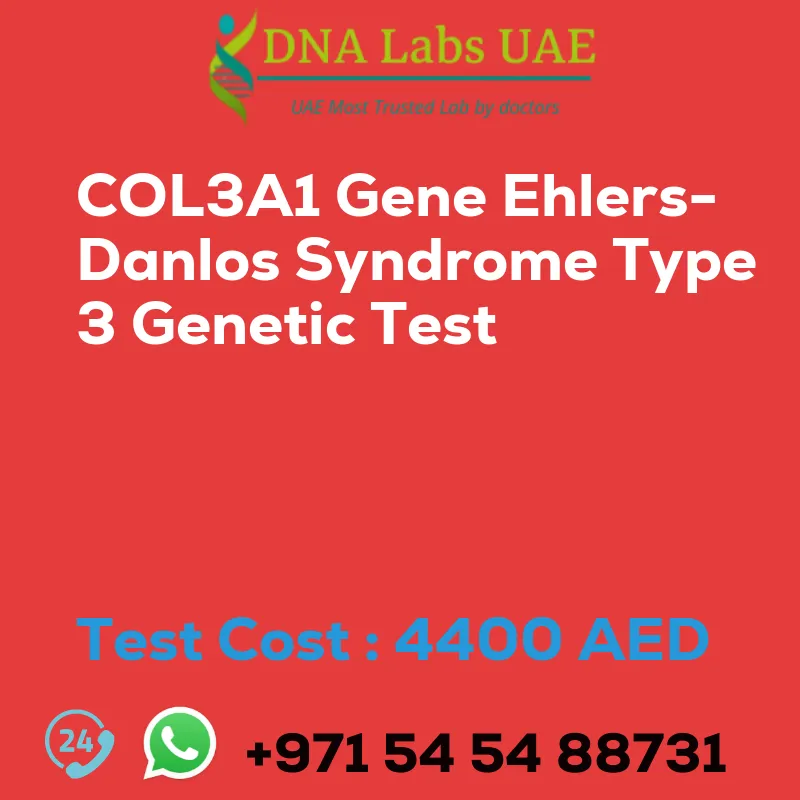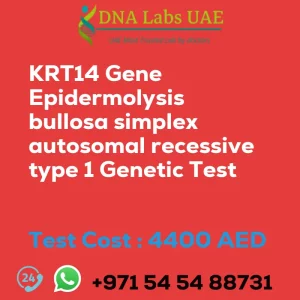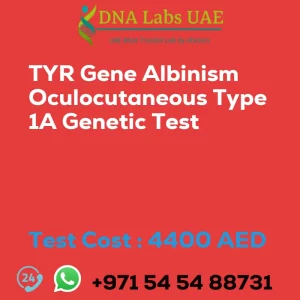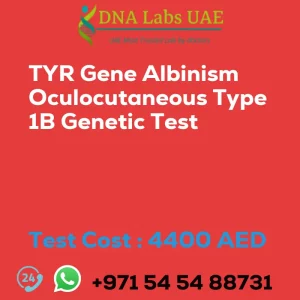COL3A1 Gene Ehlers-Danlos Syndrome Type 3 Genetic Test
Components: COL3A1 Gene Ehlers-Danlos syndrome type 3 Genetic Test
Price: 4400.0 AED
Sample Condition: Blood or Extracted DNA or One drop Blood on FTA Card
Report Delivery: 3 to 4 Weeks
Method: NGS Technology
Test Type: Osteology Dermatology Immunology Disorders
Doctor: Dermatologist
Test Department: Genetics
Pre Test Information: Clinical History of Patient who is going for COL3A1 Gene Ehlers-Danlos syndrome type 3 NGS Genetic DNA Test. A Genetic Counselling session to draw a pedigree chart of family members affected with COL3A1 Gene Ehlers-Danlos syndrome type 3 NGS Genetic DNA Test gene COL3A1
Test Details: The COL3A1 gene is responsible for providing instructions for the production of a protein called type III collagen. This protein is important for the structure and strength of connective tissues in the body, such as the skin, blood vessels, and organs. Ehlers-Danlos syndrome (EDS) type 3, also known as hypermobile EDS, is a genetic disorder characterized by joint hypermobility, skin hyperextensibility, and tissue fragility. It is caused by mutations in the COL3A1 gene, which result in the production of abnormal type III collagen or reduced amounts of this protein.
NGS (Next-Generation Sequencing) genetic testing is a technique used to analyze multiple genes simultaneously and detect mutations or variations in the DNA sequence. In the context of Ehlers-Danlos syndrome type 3, NGS genetic testing can be used to identify specific mutations or variations in the COL3A1 gene that are associated with this condition. By identifying these genetic variations, NGS testing can help confirm a diagnosis of Ehlers-Danlos syndrome type 3 and provide information about the specific mutation present in an individual. This information can be useful for genetic counseling, understanding the inheritance pattern, and potentially guiding treatment decisions.
It’s important to note that genetic testing should be performed and interpreted by qualified healthcare professionals who specialize in genetics. They can provide appropriate counseling and guidance based on the test results.
| Test Name | COL3A1 Gene Ehlers-Danlos syndrome type 3 Genetic Test |
|---|---|
| Components | |
| Price | 4400.0 AED |
| Sample Condition | Blood or Extracted DNA or One drop Blood on FTA Card |
| Report Delivery | 3 to 4 Weeks |
| Method | NGS Technology |
| Test type | Osteology Dermatology Immunology Disorders |
| Doctor | Dermatologist |
| Test Department: | Genetics |
| Pre Test Information | Clinical History of Patient who is going for COL3A1 Gene Ehlers-Danlos syndrome type 3 NGS Genetic DNA Test. A Genetic Counselling session to draw a pedigree chart of family members affected with COL3A1 Gene Ehlers-Danlos syndrome type 3 NGS Genetic DNA Test gene COL3A1 |
| Test Details |
The COL3A1 gene is responsible for providing instructions for the production of a protein called type III collagen. This protein is important for the structure and strength of connective tissues in the body, such as the skin, blood vessels, and organs. Ehlers-Danlos syndrome (EDS) type 3, also known as hypermobile EDS, is a genetic disorder characterized by joint hypermobility, skin hyperextensibility, and tissue fragility. It is caused by mutations in the COL3A1 gene, which result in the production of abnormal type III collagen or reduced amounts of this protein. NGS (Next-Generation Sequencing) genetic testing is a technique used to analyze multiple genes simultaneously and detect mutations or variations in the DNA sequence. In the context of Ehlers-Danlos syndrome type 3, NGS genetic testing can be used to identify specific mutations or variations in the COL3A1 gene that are associated with this condition. By identifying these genetic variations, NGS testing can help confirm a diagnosis of Ehlers-Danlos syndrome type 3 and provide information about the specific mutation present in an individual. This information can be useful for genetic counseling, understanding the inheritance pattern, and potentially guiding treatment decisions. It’s important to note that genetic testing should be performed and interpreted by qualified healthcare professionals who specialize in genetics. They can provide appropriate counseling and guidance based on the test results. |








